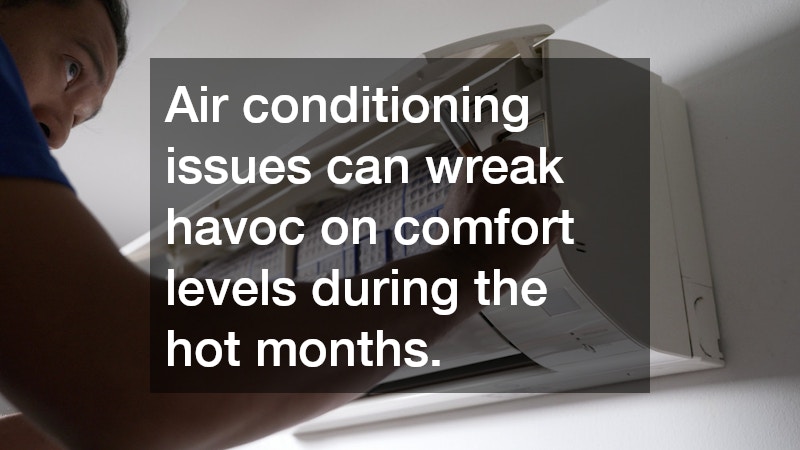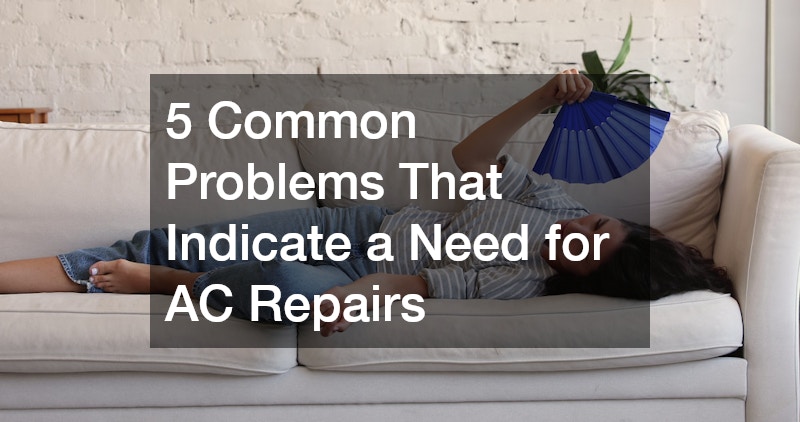As the mercury rises, air conditioners become a necessity to combat the heat. But what happens when your cooling system isn’t up to the task? This article outlines the top five problems that commonly signify the need for an AC repair, helping you decide when it’s time to call in the professionals.
Why Is My AC Not Cooling My Home Properly?
When your AC fails to cool your home as expected, you may be dealing with dirty or clogged filters. Filters are critical for both airflow and air quality, and over time they can accumulate dust and debris.
Regularly cleaning or replacing these filters is essential to maintain the efficiency of your cooling system and improve indoor air quality.
Another potential issue is refrigerant leaks, which can drastically reduce your AC’s cooling capacity. Low refrigerant levels not only diminish performance but can also increase energy consumption as the system works harder to cool your space. It’s crucial to have a professional address leaks, ensuring the refrigerant is at the proper level for optimal operation.
Thermostat malfunctions may also cause your AC to cool unevenly or inadequately. A faulty thermostat can misread the room temperature, leading to unsatisfactory climate control. Ensuring your thermostat is functioning correctly can stabilize your indoor temperature and improve comfort.
Why is my AC Producing Strange Noises?
Strange noises from your AC unit can be alarming and often indicate underlying problems. Loose or worn-out parts might produce banging, rattling, or clanking sounds, suggesting the need for immediate attention. Regular maintenance checks can help identify these problems early, preventing further damage to the unit.
Fan motor issues are another source of unusual noises and can manifest as squealing or screeching sounds. These noises suggest that the fan motor may need servicing or replacement to restore smooth operation. Addressing fan motor problems promptly can prevent more extensive damage to the AC unit.
Issues with the compressor, a key component of the cooling system, can also lead to disturbing sounds. Grinding or growling noises often indicate compressor malfunctions, which can lead to costly repairs if not addressed. Keeping the compressor well-maintained is vital for the overall health of your AC system.
What Causes My AC to Cycle On and Off Frequently?
Frequent cycling of your AC system, known as short cycling, can be caused by an oversized unit. An oversized AC may cool the space too rapidly, leading to short bursts of activity that interrupt humidity control. Correctly sizing your AC unit according to your space can prevent this issue, promoting efficient operation.
Electrical issues, such as faulty wiring or components, can also cause your system to turn on and off abruptly. These problems not only disrupt the unit’s performance but can also pose safety risks if not resolved quickly. Having a qualified technician inspect the electrical components can ensure reliable and safe operation.
Clogged air vents can cause pressure imbalances, leading to frequent cycling. Ensuring that air vents remain unobstructed facilitates proper airflow, allowing the system to maintain a balanced temperature. Regular cleaning of air ducts and vents is crucial for efficient cooling and reduced energy consumption.
Why Is My AC Leaking Water?
Water leakage from your AC unit is a common problem, often resulting from a blocked condensate drain line. Over time, algae and debris can clog the line, causing water to overflow. Routine maintenance that includes cleaning the drain line can prevent such blockages and associated leaks.
Improper installation can also lead to water leakage, particularly if the unit isn’t level. An uneven AC unit can cause drainage issues, preventing water from flowing efficiently into the drain pan. Ensuring that your AC is installed correctly from the start can help avoid future drainage problems.
Frozen evaporator coils can melt and cause excess water to leak from the unit. This issue often arises from poor airflow or refrigerant issues, which can cause the coils to freeze. Addressing the root causes and ensuring adequate airflow can prevent freezing and the resultant water leaks.
Is Poor Airflow from My AC a Concern?
Poor airflow from your AC can be indicative of ductwork issues, including leaks or blockages. Such problems can significantly reduce the system’s efficiency and overall cooling effectiveness. Ensuring your ductwork is in good condition is essential for maintaining optimal airflow and system performance.
Problems with the fan can also lead to insufficient air circulation, resulting in uneven cooling. A malfunctioning fan prevents the system from dispersing cooled air effectively throughout your home. Regular inspections of the fan and associated components can ensure they function properly, facilitating consistent cooling.
Inadequate insulation in your home can cause significant air loss, leading to reduced cooling efficiency. Proper insulation helps maintain the desired temperature within your home by minimizing outside temperature influence. Enhancing insulation can significantly influence energy usage and comfort levels, making it an essential aspect of home maintenance.
Air conditioning issues can wreak havoc on comfort levels during the hot months. By understanding these common problems and their solutions, you can address them promptly, ensuring your AC unit runs efficiently throughout the cooling season. Keep these insights in mind to help maintain a cool and comfortable home.

